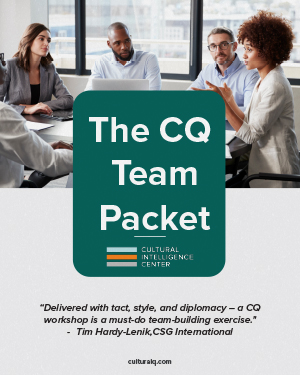Peer-Reviewed Research
Explore the academic foundation behind the CQ® framework.
Assessing Cross-Cultural Competence: A Review of Available Tests
By:Matsumoto, D., & Hwang, H.C. (2013)
Published in:
Journal of Cross-Cultural Psychology, 44:849-873
A Bi-Factor Theory of the Four-Factor Model of Cultural Intelligence: Meta-Analysis and Theoretical Extensions
By:Rockstuhl, T., & Van Dyne, L. (2018)
Published in:
Organizational Behavior and Human Decision Processes 148: 124-144.
Cultural Intelligence
By:Van Dyne, L., Ang, S., Tan, M.-L., & Rockstuhl, T. (2024)
Published in:
Oxford Bibliographies
Evaluating an Intensive Program to Increase Cultural Intelligence: A Quasi-Experimental Design
By:Alexander, K. C., Ingersoll, L. T., Calahan, C. A., Miller, M. L., Shields, C. G., Gipson, J. A., & Alexander, S. C. (2021)
Published in:
Frontiers: The Interdisciplinary Journal of Study Abroad
Innovative Horizons: The Role of Cultural Intelligence in Encouraging Constructive Deviance and the Mediating Role of Employee Engagement in Hotels
By:Bukhari, S., Abas, B., Farrukh, M., & Zargar, S. M. (2025)
Published in:
Journal of Hospitality and Tourism Insights, 8(3), 1133-1149
Handbook of Cultural Intelligence Research
By:Thomas, D. C., & Liao, Y. eds. (2023)
Published in:
Cheltenham, UK: Edward Elgar
A Bi-Factor Model of Cultural Intelligence: Comparison with Four-Factor and Hierarchical Models
By:Rockstuhl, T. & Van Dyne, L. (2023)
Published in:
D.C. Thomas & Y. Liao (Eds.), Handbook of cultural intelligence research (89-104). Cheltenham, UK: Elgar Publishing
Reviewing a Half a Century of Measuring Cross-Cultural Competence: Aligning Theoretical Constructs and Empirical Measures
By:Richter, N. F., Schlaegel, C., Taras, V., Alon, I., & Bird, A. (2023)
Published in:
International Business Review, 32(4), 102-122
Cultural Intelligence: An Identity Lens on the Influence of Cross-Cultural Experience
By:Pidduck, R. J., Shaffer, M. A., Zhang, Y., Cheung, S. S., & Yunlu, D. G. (2022)
Published in:
Journal of International Management, 28(3), 100928
